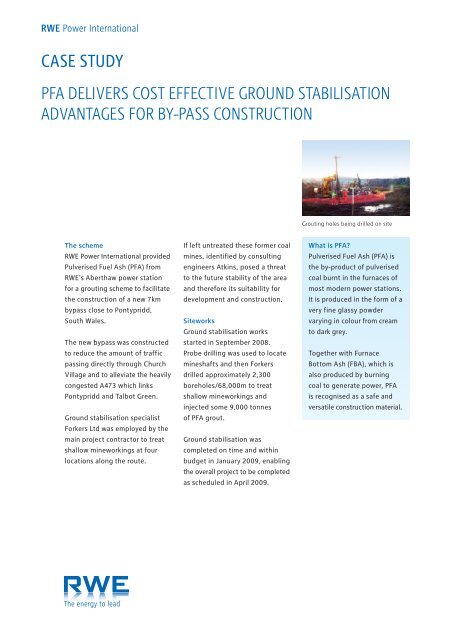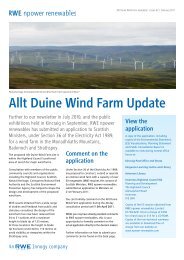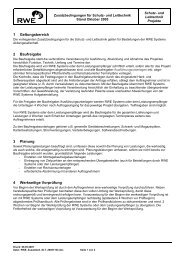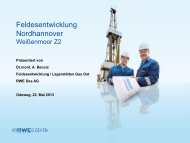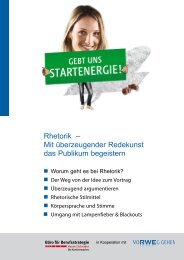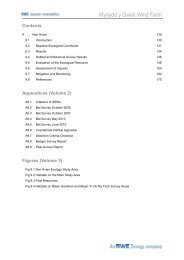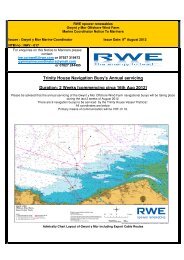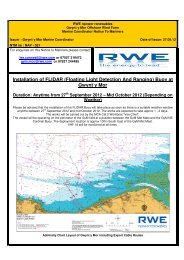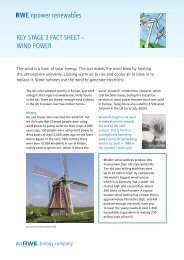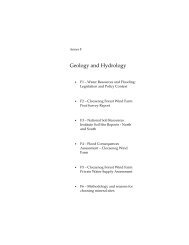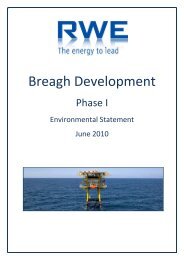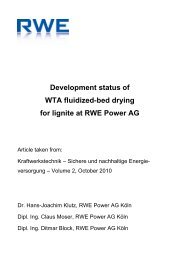PDF | 0.3 MB - RWE.com
PDF | 0.3 MB - RWE.com
PDF | 0.3 MB - RWE.com
Create successful ePaper yourself
Turn your PDF publications into a flip-book with our unique Google optimized e-Paper software.
<strong>RWE</strong> Power International<br />
CASE STUDY<br />
PFA DELIVERS COST EFFECTIVE GROUND STABILISATION<br />
ADVANTAGES FOR BY-PASS CONSTRUCTION<br />
The scheme<br />
<strong>RWE</strong> Power International provided<br />
Pulverised Fuel Ash (PFA) from<br />
<strong>RWE</strong>’s Aberthaw power station<br />
for a grouting scheme to facilitate<br />
the construction of a new 7km<br />
bypass close to Pontypridd,<br />
South Wales.<br />
The new bypass was constructed<br />
to reduce the amount of traffic<br />
passing directly through Church<br />
Village and to alleviate the heavily<br />
congested A473 which links<br />
Pontypridd and Talbot Green.<br />
Ground stabilisation specialist<br />
Forkers Ltd was employed by the<br />
main project contractor to treat<br />
shallow mineworkings at four<br />
locations along the route.<br />
If left untreated these former coal<br />
mines, identified by consulting<br />
engineers Atkins, posed a threat<br />
to the future stability of the area<br />
and therefore its suitability for<br />
development and construction.<br />
Siteworks<br />
Ground stabilisation works<br />
started in September 2008.<br />
Probe drilling was used to locate<br />
mineshafts and then Forkers<br />
drilled approximately 2,300<br />
boreholes/68,000m to treat<br />
shallow mineworkings and<br />
injected some 9,000 tonnes<br />
of PFA grout.<br />
Ground stabilisation was<br />
<strong>com</strong>pleted on time and within<br />
budget in January 2009, enabling<br />
the overall project to be <strong>com</strong>pleted<br />
as scheduled in April 2009.<br />
Grouting holes being drilled on site<br />
What is PFA?<br />
Pulverised Fuel Ash (PFA) is<br />
the by-product of pulverised<br />
coal burnt in the furnaces of<br />
most modern power stations.<br />
It is produced in the form of a<br />
very fine glassy powder<br />
varying in colour from cream<br />
to dark grey.<br />
Together with Furnace<br />
Bottom Ash (FBA), which is<br />
also produced by burning<br />
coal to generate power, PFA<br />
is recognised as a safe and<br />
versatile construction material.
Grouting pipework Grout mixture being prepared<br />
Why PFA?<br />
PFA rather than sand grout was<br />
selected due to its long term<br />
<strong>com</strong>pressive strength when mixed<br />
with cement. The mix also<br />
conformed to the flow and bleed<br />
characteristics specified for the<br />
job - using sand would have<br />
required more water and increased<br />
logistical difficulties and therefore<br />
costs. The flow properties of<br />
PFA grout allow it to be pumped<br />
further, again making site<br />
logistics easier to manage.<br />
From an environmental<br />
perspective, the use of PFA rather<br />
than sand reduced the need for<br />
quarried products. In addition, the<br />
density of sand is considerably<br />
greater than PFA so much more<br />
sand would have been needed<br />
to produce the same volume of<br />
grout; the lower density and cost<br />
per tonne of PFA considerably<br />
reduced the cost of the grout<br />
mix. The reduction in material<br />
movements also results in<br />
reduced CO 2 emissions.<br />
<strong>RWE</strong> Power International<br />
Generation Aggregates<br />
Electron<br />
Windmill Hill Business Park<br />
Whitehill Way, Swindon<br />
Wiltshire SN5 6PB<br />
United Kingdom<br />
T +44 (0)800 731 2865<br />
F +44 (0)1793 892421<br />
E generation.aggregates@rwenpower.<strong>com</strong><br />
I www.generationaggregates.<strong>com</strong><br />
Speaking of the use of PFA in<br />
ground stabilisation projects,<br />
Chris McCooey, Commercial<br />
Manager at Forkers said:<br />
“We’re always keen to use PFA<br />
if possible because of cost and<br />
its particulate nature which<br />
has benefits in the mixing and<br />
pumping process. Using PFA<br />
is also beneficial from a<br />
sustainability perspective.<br />
By re-using a by-product of<br />
the power generation process,<br />
we can avoid unnecessary<br />
quarrying of raw materials.”<br />
Registered office:<br />
<strong>RWE</strong> Npower plc<br />
Windmill Hill Business Park<br />
Whitehill Way, Swindon<br />
Wiltshire SN5 6PB<br />
Registered in England and Wales no. 3892782<br />
What is grout?<br />
Grout is required when<br />
inaccessible voids require<br />
filling to improve ground<br />
stability, increase the<br />
shearing resistance and<br />
strength and reduce<br />
permeability. This is<br />
normally achieved by<br />
injecting suspensions,<br />
emulsions and solutions<br />
into the ground to improve<br />
the geotechnical properties<br />
of the soils and rocks.<br />
PFA grouts are suspension<br />
<strong>com</strong>positions produced<br />
on site, normally using PFA,<br />
Portland cement and water.<br />
PFA has been used for many<br />
years as an alternative to<br />
sand and cement grouts<br />
because of the technical,<br />
durability and economic<br />
advantages it offers.


